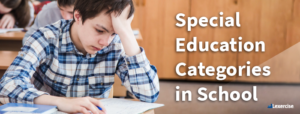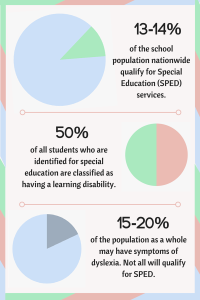Special Education Categories in School
Written by Sandie Barrie Blackley, Speech-Language Pathologist
Published on May 5, 2016
 If your child has dyslexia, the school system may throw some words at you that have different meanings in different contexts. We want to make sure you are equipped with the best information before you make decisions that affect your child’s education. Let’s review the different categories of Special Education.
If your child has dyslexia, the school system may throw some words at you that have different meanings in different contexts. We want to make sure you are equipped with the best information before you make decisions that affect your child’s education. Let’s review the different categories of Special Education.
What is Special Education?
Special education is the practice of educating students with special educational needs in a way that is designed to address their individual differences and needs. A federal law, The Individuals With Disabilities Education Act (IDEA), requires that public schools provide special education (with an Individual Education Plan or IEP) to eligible students, but not every struggling student is eligible. Eligibility requires that the student’s school performance be “adversely affected” by a disability in one of 13 specified categories:
- specific learning disability – includes reading and writing disorders like dyslexia
- other health impairment – includes attention and executive function disorders
- autism spectrum disorder
- emotional disturbance
- speech or language impairment
- visual impairment
- deafness
- hearing impairment
- deaf-blindness
- orthopedic impairment – includes cerebral palsy
- intellectual disability
- traumatic brain injury
- multiple disabilities
Specific Learning Disability

Specific learning disability (SLD) is the category that dyslexia and dysgraphia fall under for purposes of public school special education services. The Individuals with Disabilities Education Act (IDEA) defines a specific learning disability as “a disorder in one or more of the basic psychological processes involved in understanding or in using language, spoken or written, that may manifest itself in the imperfect ability to listen, think, speak, read, write, spell or do mathematical calculations.” SLD is the largest special education category, and an estimated 80% of students with SLD have a reading impairment.1
Many struggling readers are not eligible for public school special education services. While about 14% of students are eligible for special education services, 25-33% of students read at a below basic level.2
Dyslexia is more common than you may think, with 15-20% of the school population showing symptoms. If your child has not been diagnosed but is showing symptoms, take our dyslexia screener here for free.
1 What Is Specific Learning Disorder? American Psychiatric Association, Retrieved March 28,2022.
Improve Your Child’s Reading
Learn more about Lexercise today.
Schedule a FREE
15-minute consultation


